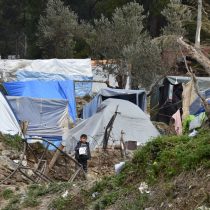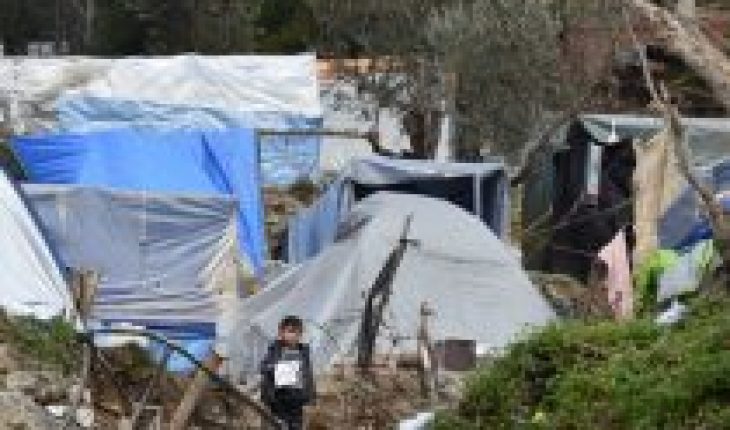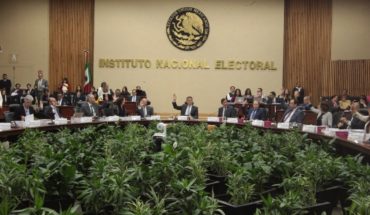
Doctors Without Borders reported that, at the heart of the Covid-19 pandemic, and with an active outbreak in the Vathy refugee camp in Greece where there have already been more than a hundred positive cases, there is still no adequate medical response plan. In addition, they point out that in Vathy there are only two Army doctors and three nurses to care for 4,300 people, some of whom suffer from serious illnesses. Worse, they say, “the conditions of isolation and quarantine in Vathy for those who test Covid-19 positive are unacceptable at best and dangerous at worst.”
“Refugees, migrants and isolated asylum seekers are locked in dirty modules, most sleep on the ground, while some of these containers do not have running water or bathing,” the organization denounces.
In Samos, the overcrowding situation in the Vathi countryside is unsustainable, the center hosts 11 times more people than the capacity for which it was designed
“In other modules,” they add, “the ground is broken and full of holes. Quarantiners have very limited access to basic services such as sanitation and food. The food, as in the rest of the camp, is sometimes incomestible and is sometimes delivered past the expiration date.”
Omaima Alhabib is 52 years old and from Deir ez Zor, Syria. Omaima suffers from neurological problems and asthma and her husband suffers from hypertension and cardiovascular problems. “We’ve been in this field for a year. It’s terrible, it’s full of dirt. Since I’m asthmatic, I don’t want to see the doctor here because I’m afraid I’ll be quarantined. I’d rather be in my tent that’s full of rats and snakes, but at least I’m not going to be in direct contact with other sick people in the same module,” she says.
“I’m three months pregnant and I’m asthmatic. We are sleeping on the ground, the whole floor is broken, full of cockroaches and dirt,” says Hanan Khider, a refugee in the Vathy countryside.
Doctors Without Borders (MSF) has patients including mental health cases, pregnant women and survivors of sexual violence who are extremely vulnerable due to their health conditions. These people see their vulnerability and risk increased every day they are kept in these heinous conditions. Many residents of the camp have informed MSF health promoters that they will not go to the field doctor because they are afraid of the terrible conditions in the isolation containers in the event of a positive.
“Positive coronavirus people remain in isolation modules. We know from our patients that the conditions in these containers are abominable. There are holes in the ground, cockroaches and rats and food is inadequate. In addition, patients with different health needs and problems are in the same containers as women with newborns, families and the elderly. This has to stop,” says Mirjam Molenaar, SPS medical coordinator at Samos.
Designed to accommodate about 650 people houses more than 4,300, who according to the testimonies collected by MSF even prefer to live in their tent rather than allow their transfer to quarantine modules.
For more than six months, MSF has been calling for the urgent transfer to the continent of the elderly and patients with chronic and complex diseases. However, they are still forced to live in tents and modules where they cannot take any action to protect themselves from COVID-19. Today, in Samos there are about 40 families among whom there are people at high risk and who could face life-threatening consequences if they are not protected.
“Many of our patients live in woeful conditions. We are talking about pregnant women and high-risk patients with cardiovascular, lung or diabetes diseases. These people should have been transferred to the mainland months ago,” says the SPS medical manager.
MSF calls on the competent authorities to urgently increase support for EODY, the greek health system’s public health agency, in Samos, which is currently inadequate to respond to the COVID-19 outbreak in the Hotspot (the IDENTIFICATION and registration center) of Vathy. It also requests that they identify adequate quarantine and isolation spaces in accordance with international COVID-19 protocols providing a minimum of decent living conditions ensure continuity of care for patients with chronic diseases or other serious conditions under which confinement and quarantine measures are in place.
MSF also calls for the provision of isolation environments adapted for vulnerable patients, such as pregnant women and people with serious mental health problems, and that people residing in Vathy be reported correctly and in the language they can understand, so that they understand the response to COVID-19, especially those who are quarantined and isolation.





